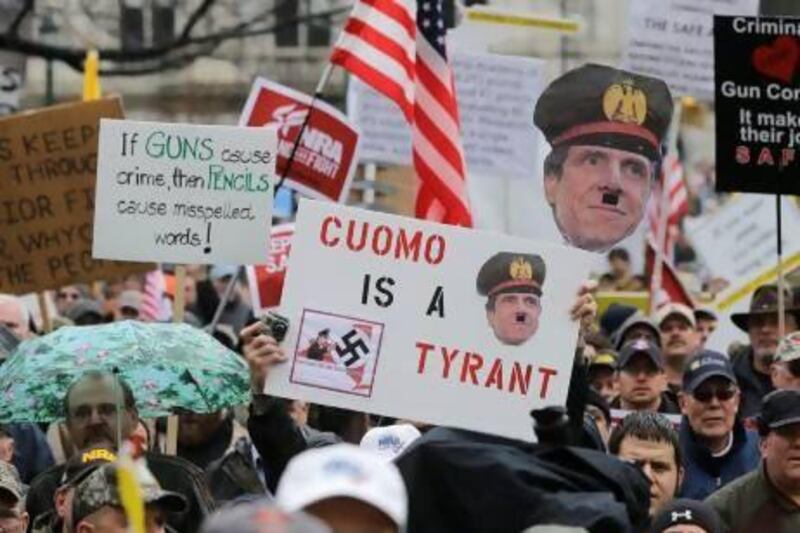When the president of Ohio's state school board posted her opposition to gun control, she used a powerful symbol to make her point: a picture of Adolf Hitler.
When a well-known conservative commentator decried efforts to restrict guns, he argued that if only Jews in Poland had been better armed, many more would have survived the Holocaust.
In the months since the school massacre in Newtown, Connecticut, some gun rights supporters have repeatedly compared US gun control efforts to Nazi restrictions on firearms, arguing that limiting weapons ownership could leave Americans defenceless against home-grown tyrants.
But some experts say that argument distorts a complex and contrary history. In reality, scholars say, Hitler loosened the tight gun laws that governed Germany after the First World War, even as he barred Jews from owning weapons and moved to confiscate them.
Advocates who cite Hitler in the current US debate overlook that Jews in 1930s Germany were a very small population, owned few guns before the Nazis took control, and lived under a dictatorship commanding overwhelming public support and military might, historians say. While it does not fit neatly into the modern-day gun debate, they say, the truth is that for all Hitler's unquestionably evil acts, his firearms laws likely made no difference in Jews' very tenuous odds of survival.
But comparisons between a push by gun control advocates in the US and Hitler have become so common - in online comments and letters to newspaper editors, at gun rights protests and in public forums - they are often asserted as fact, rather than argument.
After some gun advocates rallied at New York's capital in February carrying signs depicting the governor, Andrew Cuomo, as Hitler, National Rifle Association President David Keene said the analogy was appropriate.
"Folks that are cognisant of the history, not just in Germany but elsewhere, look back to that history and say we can't let that sort of thing happen here," Mr Keene told a radio interviewer this month.
Those comparisons between gun control now and under Hitler joined numerous other statements, including the one by the Ohio school board president, Debe Terhar, on her personal Facebook page in January and by conservative commentator Andrew Napolitano, writing in The Washington Times.
The comparisons recently prompted the Anti-Defamation League, a Jewish civil rights group, to call on critics of gun control to keep Hitler and the Nazis out of the debate.
The rhetoric "is such an absurdity and so offensive and just undermines any real understanding of what the Holocaust was about", said Ken Jacobson, the ADL's deputy national director. "If they do believe it, they're making no serious examination of what the Nazi regime was about."
But some gun rights advocates firmly disagree.
"People who fail to learn from history are doomed to repeat it," said Charles Heller, executive director of Jews for the Preservation of Firearms Ownership, which has long compared US gun control to Nazi tactics. "I guess if you're pro-Nazi, they are right. But if you're pro-freedom, we call those people liars."
Comparing gun control activism to Hitler is not new. In a 1994 book, Guns, Crime and Freedom, the NRA executive vice president Wayne LaPierre wrote that "In Germany, firearm registration helped lead to the Holocaust."
But the history of civilian gun ownership under the Nazis, scholars say, is far more complicated than the rhetoric indicates.
After the First World War, Germany signed a peace treaty requiring dismantling of much of its army and limiting weapons import and export. But many of the 1 million soldiers returning home joined armed militias, including a Nazi Party force that saw Communists as the leading threat.
"Technically, they (the militias) were illegal and the guns were illegal, but a lot of government officials didn't care about right-wingers with guns taking on Communists," said David Redles, co-author of Hitler and Nazi Germany: A History, a popular college text. By 1928, however, officials decided they had to get a handle on the militias and their weapons and passed a law requiring registration of all guns, said Mr Redles, who teaches at Cuyahoga Community College in Cleveland.
Soon after Hitler was named chancellor in 1933, he used the arson of the Reichstag as an excuse to push through a decree allowing for the arrest of many Communists and the suspension of civil rights including protections from search and seizure. But as the Nazis increasingly targeted Jews and others they considered enemies, they moved in 1938 to loosen gun statutes for the loyal majority, said Bernard Harcourt, a University of Chicago professor of law and political science who has studied gun regulations under Hitler.
The 1938 law is best known for barring Jews from owning weapons, after which the Nazis confiscated guns from Jewish homes. But Mr Harcourt points out that Hitler's gun law otherwise completely deregulated acquisition of rifles, long guns and ammunition. It exempted many groups from requiring permits. The law lowered the age for legal gun ownership from 20 to 18. And it extended the validity of gun permits from one year to three years.
"To suggest that the targeting of Jews in any of the gun regulations or any of the other regulations is somehow tied to Nazis' view of guns is entirely misleading," Mr Harcourt said, "because the Nazis believed in a greater deregulation of firearms. Firearms were viewed, for the good German, were something to which they had rights."






